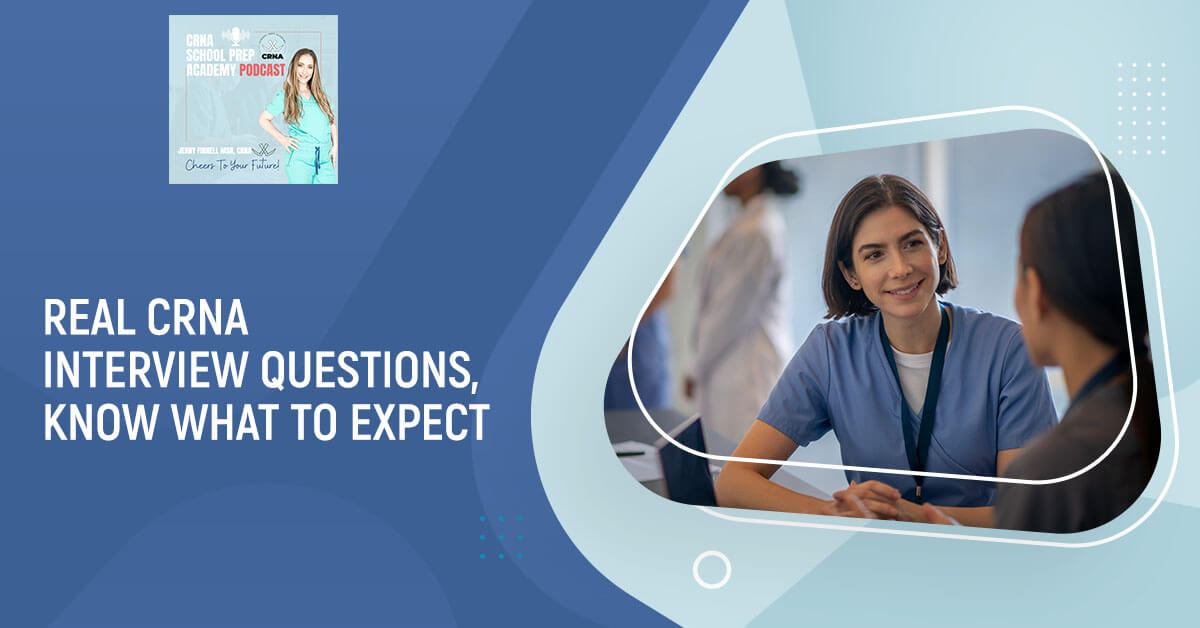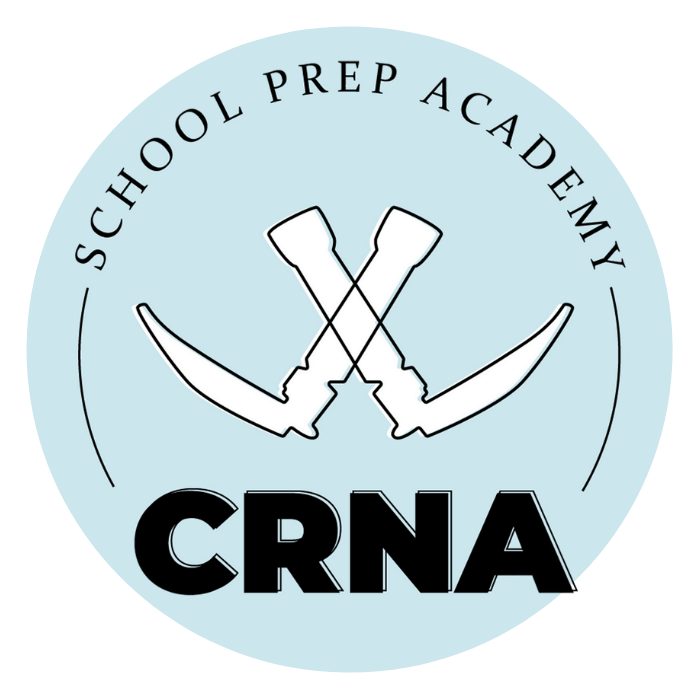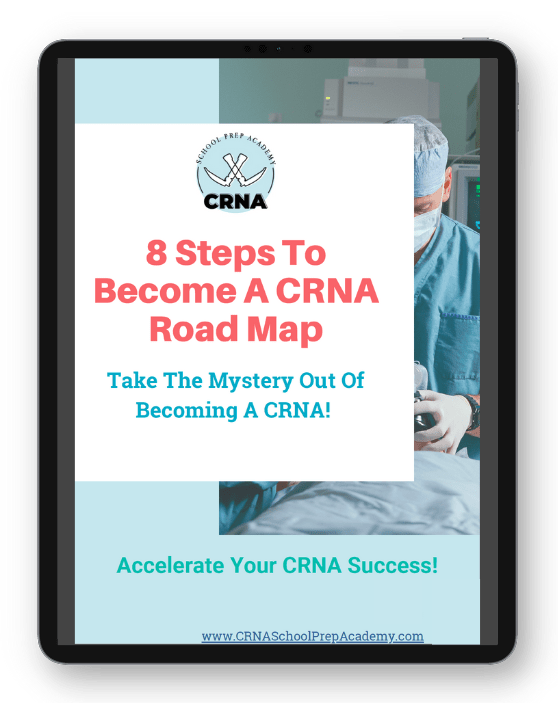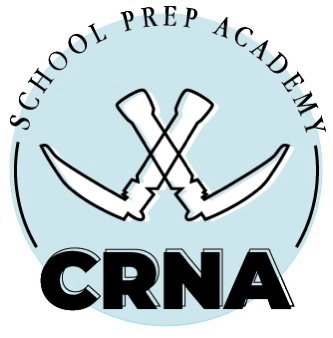
Gearing up for your CRNA school interview and want to know what to expect? Fear not, future CRNA- we’ve got you covered!
Today, we are listing out some of the hard-hitting questions you may not be expecting during your CRNA school interview. Our goal is to help you be as prepared as possible, so you can knock this interview out of the park!
In this episode, we cover-
How to handle CRNA school interview questions for which you have no answer
Key personality questions you need to be prepared for (to showcase those strengths!)
The importance of being able to demonstrate your financial readiness
Communicating effectively about how you will handle the stress of school with a wellness plan in place
Why you NEED to know your drugs at a cellular level
Understanding and communicating in-depth knowledge about physiology & pharmacology
Keeping your social media professional throughout your student career (because programs are watching!)
Take a deep breath, future CRNA! You’re ready to ROCK this interview!
Grab your FREE copy of our CRNA School Interview Questions here!
https://crnaschoolprepacademy.
Learn more about CRNA School Prep Academy’s SRNA Mentoring here!
https://crnaschoolprepacademy.
Get access to planning tools, valuable CRNA Faculty guidance & mapped out courses that have been proven to accelerate your CRNA success! Become a member of CRNA School Prep Academy here:
https://www.crnaschoolprepacademy.com/join
Book a mock interview, resume edit or personal statement critique:
Join us at the CRNA School Prep Academy Conference!
https://events.crnaschoolprepacademy.com
—
Watch the episode here
Listen to the podcast here
Real CRNA School Interview Questions, Know What To Expect
I wanted to let you know about an amazing opportunity to connect with CRNA program faculty, current nurses, anesthesia residents, and fellow aspiring CRNAs. CSPA is hosting its second virtual conference on August 6th and 7th, 2022. I hope to see you there. Here’s the agenda to get an idea of what you will get from attending this conference: We’re going to cover Pathophysiology for the CRNA School interview, Pharmacology for the CRNA School interview, and how to study by utilizing neuroscience.
There’s also going to be networking with current students face-to-face, one-on-one, exchange digits, and how to pay for graduate school. This is also a chance for you to ask questions about this topic. We’re going to have a faculty Q&A session where we’re going to put them in the hot seat and allow you to ask them questions about how to stand out as an applicant.
You’re also going to learn emotional intelligence for the CRNA interview and how to best prepare for this. We’re also going to discuss how to gain leadership roles that the schools are looking for. We’re going to have school expo booths, which are going to allow you to ask questions abound their program and how to stand out as an applicant.
Now, even if you’re not going to go or attend any of these schools on the list, I highly encourage you to attend these sessions and ask questions because the information you’re going to gain from these sessions will apply to programs all across the country. The schools who are attending the expo booth, we also have many of our guest speakers and our program faculty at these universities, but so far, the schools include the University of South Carolina, MUSC, Evansville, Mary Baldwin, South College, Kaiser Permanente then we also will have four additional schools to come.
A total of ten CRNA school programs are going to be attending this conference. Again, it’s going to give you a well-rounded picture of how to stand out as a CRNA school applicant. I hope you attend this conference. I hope to see you there. This advice and information shared are going to be invaluable for your CRNA journey. Cheers to your future and I’ll see you at the conference.
—
You’re going to want to save this episode. We are going to cover real interview questions. This will be a great resource for you when it comes time to study for your interviews. I’m literally going to go through real actual questions that students were asked, so you have a nice little study list to go by. Everyone’s afraid of their CRNA interview. I can tell you I know everyone thinks they did way worse than what they probably did. We are all our own worst critic.
I also want to remind you that these schools are not looking for perfection. Again, it doesn’t exist. Do the best you can, and that’s okay. If you don’t know something, try to tell them something you know about the topic versus saying, “I don’t know.” I’m not saying that you should make something up and completely bluntly lie, but if you don’t know the answer say, “I’m not familiar or I don’t know that but this is what I do know. This is what I can tell you around that topic.”
Know Drugs Down To The Cellular Level
They can then gauge where you’re at with your knowledge base. If you say, “I don’t know,” they have nothing to gauge with. Try to give them something to work with. Let’s go ahead and get into it. The number one thing that you will be asked in CRNA interviews is about drugs. You’re going to have to know various drugs down to the cellular level of how they react to receptor sites.
By far, the most common thing asked in CRNA’s interviews is to know your ICU drugs, vasoactive drips, sedative drugs, and ACLS drugs. Again, know them down to the cellular level and how they work. This person asks about drugs and the receptors down to the cellular level. They got asked about stroke volume, so knowing the formula for that. Frank-Starling Law and they got asked about SvO2 and how pulse-ox works, which I probably even know what program this is. I’m not going to say because it’s a favorite question.
Look up something called the Beer-Lambert Law. There’s a website called HowEquipmentWorks.com. They give a good description of the Beer-Lambert Law. If you were to visit that site, it does do a good description of how a pulse-ox works. It talks about the wavelengths, different light, and that type of thing, so check out that website. Also, for those of you who are CRNA School Prep Academy students, we have resources for pretty much all of these questions, as well as our learning library. It covers all of this in detail.
The CRNA interview is about reflecting on yourself and your experiences, both in the ICU and personally. Click To TweetInformation They Can’t Find On Your Resume
There’s no way I have time to cover all of these questions in detail. I’m literally going to be telling you the questions so you can do your own studying, for those of you who are not familiar with types of CRNA school questions. Another question that was asked is, if I had a warning label, what would it be? That’s a unique question and interesting. They also got asked, what is something about me the interview panel might not know? Again, they’re digging for a little more information from you than they can get from your resume. They’re trying to see who you are as a person.
They wouldn’t know otherwise. Don’t say, “I been a CVICU nurse for six years and prior to nursing, I was a nurse’s aide.” It’s all on your resume. They want something that they can’t find out from your resume. Make sure you’re telling them something unique about you. This one person was told to take a financial preparedness quiz prior to the interview, which was very interesting. I bet you, depending on how that quiz or survey shook out, they may ask you about financial preparedness in the interview.
This person was asked to describe late versus early signs of sepsis. Tell me about yourself. That’s a very common question, so similar to, what’s something about me that the interview panel might not know? It’s a different way to ask you the tell me about yourself thing. I’ve had students ask me, “Should I talk about work-related things as far as tell me about myself and highlight my accomplishments on my resume, or should I make it all personal?”
That’s up to you. There’s no right or wrong answer for that. Make sure if you do make it about work, you are summarizing and highlighting the main points versus regurgitating your resume. I can’t speak for all the programs, but I like personal tell me about yourself because I can get other things from your resume. If you had some major accomplishments like a Daisy Award or something like that, maybe tell the backstory about the Daisy Award. Something like that to highlight on your resume.
How You Prepared For Advanced Practice Nursing Professions
Maybe something about you that makes you who you are as a person allowed you to get that award professionally. You can still blend personal and work together for that question. If you have considered advanced practice nursing professions, how have you prepared, or have you considered other advanced practice nurse roles? That’s interesting. They might ask you, have you considered becoming an Acute Care NP or any other Acute Care NPs and why? What brought you back to CRNA?

They asked this person, how they had prepared up to this point for CRNA school? This is important to have been actively doing things. This is why I preach all the time that you should be preparing for CRNA school from the time you decide you want to do it to the time you step in the ICU. It should be a very long road ahead of you by being part of CRNA School Prep Academy, going to conferences, doing what you can to get involved in the community, plus understanding and knowing what this profession is all about by shadowing CRNAs.
How Do You Deal With Stress
Again, they’re looking for how invested you are in your career path to becoming a CRNA. How do you deal with stress? That’s a good question because you’re going to be stressed out in school. In one of my previous episodes, I talked about overall having a wellness plan. You need to have a wellness plan and know how you’re going to deal with your stress. I think it starts from having a good habit by doing this almost daily to handle your stress. If you have good coping mechanisms to handle your daily stress, you’re going to be okay in CRNA school.
Financial Readiness
They’re going to pry and ask you these things. It’s having that plan and knowing how to speak to that plan like, “This is what I do to cope with my current stress. This is how it’s going to help me in CRNA school.” This person also got asked, have you prepared financially? It’s very important too. In the last episode we did, I also covered one of the first things you should do when you gain acceptance to the school. You should be doing this prior to, but one of the first things you should hone in on is your financial readiness once you gain acceptance. Get everything in order.
How You Overcome Failures
Tell us about a failure in your life and how you overcame it. I think people have a hard time thinking about when they failed. I know if you’re like me, sometimes when something negative happens, it must be a protective mechanism, but I black that out. I don’t hone in on it or dwell on it. Over a period of time, I tend to forget those things or I don’t remember them in great detail. Don’t get me wrong. I can speak of some bigger failures but it’s important to start thinking about that now so you have the details.
I could probably tell you what I’ve failed at, but could I tell you all the details? Not unless I’ve probably dwelled and focused on it. I don’t know if that’s a bad thing or a good thing. I’m saying I know that’s how I am. If something happens to me that’s not good, I tend to try not to put too much focus on it. I try to keep moving forward from it. When I’m asked what the details are later, I’m like, “I don’t know but this is how it turned out, and I’m okay now.” Anyhow, it’s something to think about.
You should know the medications you're giving and understand how they work. Click To TweetHow You Deal With Conflicts And Criticism From Coworkers
We obviously all learn from our failures. That’s part of what it is, but remembering the details of the failure and the actionable steps you took to overcome it is what sometimes can get a little muddy over time. Talk about a lot of conflicts where you got criticism from a coworker. That’s a good one. Has that ever happened? Do you even know about it? Pardon me things. If I had a coworker say something about me, I don’t even know if they’d be mad enough to tell me to my face.
I’m sure people have said stuff about me behind my back but have you done something where someone has confronted you on it and remembered that because it’s the same thing. I would even have a hard time thinking on the spot what that would be. I remember one time I got mad at a coworker who left out of order. I was due to leave at 3:30. It was 5:30 at night, and she was a 5:30. She left at 5:20 PM and left me in a room to finish my case.
I was angry about that. I confronted her, and we got into this little riff. We’re fine now but she was mad at me for being mad at her back. Personally, she was in the wrong. Anyhow, I’m still sticking to that story. Thinking about those things ahead of time will make it much easier to see it on the spot, especially when you’re nervous. I don’t know you guys, but I had two CRNA interviews; I have a way harder time with personal questions than I do with black and white questions.
Shadowing Experience
For me, it’s easy to study black and white stuff and be able to understand it. For the personal questions, I’d have to put a lot of effort into having a good game plan on my mind as to what I would say. It’s about being reflective on yourself and your experiences, both in the ICU and personally. This person also got asked, “Tell us about your shadowing experience.” Why I stress documentation is because if your shadow experience was years ago and now you’re in for your CRNA interview, and they want you to describe and explain your shadow experience, you’re going to be like, “Uh.”
If you documented your shadow experience and wrote down everything you learned, your takeaways, and all that stuff, you can review that prior to your interview. You can also submit it as documentation, which I think always looks good, even if they don’t require it. Even early on, document your shadowing experience. What’s cool about documenting every time is you’re going to see your growth. You’re going to see, “When I first shadowed, this was my takeaway. I was so laser-focused on a couple of things. Now that I’ve done it several times, my takeaways are a much bigger picture.”

Hypovolemic Shock
I think that would be cool to see. You can report that too when they ask you about this question, “I’ve documented every single shadow experience, and these are my big takeaways when I compare my first and my last shadow experience.” That would be a cool way to answer that question. That would be impressive. This person got asked about hemophilia shock but down to the body’s compensation, such as the RAS system, which is the Renin-Angiotensin System, so understanding that very detailed. This person, again, medications and receptors they acted on. I already touched on that. Pretty much a given that you’re going to be asked about drugs and their effects.
ICU drugs, ACLS drugs, sedation drugs, pain medication, those are the big ones, but they could even ask you about clonidine. It is a sedative drug. I have even heard about Pepcid and different histamine blockers being asked about too. Not just vasoactive drugs. Any medications you’re giving, you should understand how they work. That’s what it comes down to. It’s hard to say, “There’s so much to know,” but that’s why if you take it day by day, little by little, while you’re gaining one to two years of ICU experience is not going to feel super overwhelming.
If you wait two weeks before the interview and you’re like, “I have all these drugs to study,” it’s going to be super overwhelming. You’re probably not going to be able to know everything that quickly, but if you quiz yourself over time when you’re working in ICU, you’re going to see that drug more than once. The next time you see it, it will jog your memory of what you’ve already studied. You’ll study it again because you’ll remember it. It will be reinforced then it’s not going to feel super overwhelming to be asked about in the interview. Please take my advice and do that.
Making Decisions With Limited Facts
Tell me about a situation when you had limited facts but had to make a decision. That’s a good one. I see how it would be hard to think on your toes. What’s cool about this question and why I like it, and I guarantee that’s why they picked it, is because you will do this all the time as a CRNA and in school. What if your preceptor leaves the room then the surgeon is barking at you, and you have to make a decision on how to treat a bucking patient, you’re like, “Do I use Propofol? Do I use rock? What happens if I paralyzed them, and they’re done?”
I don’t know. I’m thinking through some things in my mind that I would have thought of as a student being scared in that situation. How quickly do you flip them off the vent? Does that even come to mind to flip them off the vent? All kinds of stuff. When you would have to make that critical decision in a split second on how to treat those vital signs, what drug do you need and how do you dose it quick? How easy is it for you to come to that conclusion? Do you feel confident enough to do it? Trust me you will because if it means the patient is not doing well, and you fall back on your knowledge, you have the knowledge and your training will get you there. Don’t be too scared about it. It will happen.
There will always be opportunities. You just have to look for them. Click To TweetThink about that, especially in the ICU. When you had a situation that you were unsure of and had limited information, but you had to make a choice, what was that and how did you handle it? If you haven’t practiced the STAR method, please do. The STAR method is Situation, Task, Action, Result. I’ve had students who I do mock interviews with; they would tell me these scenarios. They maybe would start with the beginning. They would leave out the meat of it or details that will allow me to understand the main problem at hand. The other area that people would commonly leave out was the ending. They’re like, “You left me cliffhanging. I needed to know what you did. What’s the result? How did this turn out? You need to let me know the ending.” They would tell me what happened but they wouldn’t tell me how it resolved. That’s one of the common things people forget about, especially when you’re stressed. I also want to clarify- I don’t do a lot of mock interviews anymore. I have a whole team of people who help me do mock interviews now. I’m one person. It’s hard for me to do one-on-one work.
Be a good storyteller. You want to give people a little bit of the situation. Maybe some backstories so they have some understanding and context, then take them into what happened. What actions did you have to take, the situation and the details around that, and then the action you took. It’s a Situation, Task, Action, and Result. Give the details and understanding along with some tasks related around that, and then the action you took along with the results. Practice the STAR method. You can Google STAR method and find more information on it on how to use it to tell a story.
What Your Managers Would Say About You
If your managers were present here, what would they say your weaknesses are? It’s knowing your weaknesses. A great way to know your weaknesses is to take a sixteen personality quiz. It’s free. It’s 16Personalities.com, a very well-known website. I suggest that you don’t pick neutral, either err on the side of the knower, yay or nay. If you pick neutral, it’s not going to be as accurate. It will literally tell you your strengths and weaknesses, and it will be creepy accurate. I encourage you to take that and hone in on that for your interview.
I also encourage you to fix your weaknesses, for example. Don’t say you have a weakness and it is what it is. How are you working on that weakness? What are you doing to improve that weakness? Is that something you recognize so you’re aware of it and making active steps towards being better? They do want to see that. They don’t want you to say, “Your weakness is this,” and you’re like, “I’m out. That’s my weakness and is what it is.” We’re all human. We’re all going to have weaknesses all the time.

We’re going to have a weakness. That’s to be understood, but we should always be aware of our weaknesses and try to work towards not having these weaknesses. It doesn’t mean we’re not going to have them, but if we recognize them and are aware of them, they won’t hinder us in life as much as they otherwise would.
Your Opinion On Racism
What would you do if you heard one of your coworkers make a racist remark? That’s a good one and one that I would think would catch you off guard if you hadn’t prepared for something like this. Think about it. If a situation happened and how it unfolded, and if it were to happen to you, how would you have handled it yourself? It’s something to think about.
Feedback On The Interview Process
Tell us something unique that we can’t find in your application materials. This is a very similar question to the other one that was mentioned above. What sets you apart? That could also be similar to tell me about yourself. They’re looking for something unique, but what sets you apart could be like, “Why should we pick you versus anyone else? What makes you a good candidate? What makes you a unique person, a likable person, or someone we would want to get to know? Why would we want to get to know you? What is it about you? What is your strength?
Why Their Program
There are other ways to look at that question and interpret it to get your answer. This interview style had one of five interviews. They went room-to-room and they asked this person what the most stressful interview was so far. Probably one of the last interviews, they got asked what the most stressful interview was and why? Why our program, especially for those of you who have multiple schools you’re applying to. I can’t stress enough that you have to remain organized and very clear on your why’s for individual programs.
Not just because I want to get into school, you’re going to throw your application in everywhere and, “I don’t care who you are. Take me.” They don’t want that, they don’t want to hear that, and don’t tell them that. It’s true. You need to want the school as much as they want you because you’re spending a lot of time and money. You want to make sure you’re not making a mistake. Let’s face it. Not all schools are meant for you and you’re not meant for all the schools. Both people are choosing in this process, so choose.
Be careful about what you post. The faculty are watching, and word of mouth gets around. Click To TweetDon’t just say you want to go anywhere. Have a reason why you want to go to this program. Research their mission. What are they passionate about? What’s their mission statement? Understand that. What are some breaking points they’ve mentioned in their open houses that you have attended? I always preach you should attend those. Knowing the program in and out is important because they may ask you. It’s not going to impress them when you don’t know about their program. They’re going to think, “She doesn’t want it that bad.” That’s what I would think.
Study Techniques
How did you study for your certification NCLEX? That’s interesting. In this question, they’re digging into your study techniques. Do you have those study techniques? This is a common area of weakness a lot of students experienced during anesthesia school, so they are evaluating for that now in the interview. A lot of students can coast by, get good grades in undergrad, and get their BSN. If it’s CRNA school, it’s a whole different ball game because of the amount of material you have to learn at once. You have to have not only good study techniques but efficient study techniques, which is easier said than done. If you haven’t read my study technique episode, please do that now. I believe it was episode 39. It wasn’t too long ago.
Nursing Intervention For A Pneumo Patient
Nursing intervention for a patient with a pneumo and resident fellow staff were not around. That’s a good one. What would you do for a pneumo? The way I would start this question is to understand the physiology behind it. I would tell that to them out loud. You would then talk about what you do. If you’re experiencing a pneumo, you want to make sure they’re tanked up and going to increase pressure, so decrease SVR. I would start with the physiology process of what a pneumo is and how you would treat it. That’s what I would do.
About ARDS
What is ARDS? That’s a loaded question. Going into the whole ARDS but understanding the zones of your lung, also, maybe even wide-pruning can help that. It would be a cool way to answer that question. What vent settings would you use with ARDS? We all know that people with ARDS are at a high PEEP but we also understand how PEEP can be bad. I would challenge you to know that. How can PEEP be bad, or what are some of the consequences of a high PEEP? What vents them? Would you use high tidal volumes? Most of us know that you wouldn’t. Do you know why? I challenge you to know that.
Drugs, Receptors, And How They Work
What is tidal volume, and how is minute ventilation calculated? That’s a good one too. Why is lower tidal volume used with ARDS? I challenge you to look that one up. Name a drug that has an alpha-2 agonist. Backing up a little bit to the tidal volume with ARDS, your lungs are filled with fluid, you’re alveoli are obviously succumbing to a lot of damage, and you have elasticity in your alveoli sacks. They are full of pus and grossus.

There’s something called Barotrauma and it’s much easier done when you already have an ARDS picture going on with your lungs, so you can worsen your ability to ventilate with high tidal volumes. Anyhow, look it up. It’s way more complex than that but I want to give you a broad overview. Name a drug that is an alpha-2 agonist. How does NEO cause bradycardia? That’s a good one, too. What vent setting changes would you make with a patient who is acidotic? A lot of interviews will ask you about ABG interpretation.
We have a whole ABG workshop, and as far as alpha-2 agonists and NEO, we have two pharmacology lectures inside CRNA School Prep Academy that go over all of that. Knowing your drugs and receptors and how they work. Tell us about a time you harmed a coworker. I don’t know if I’d be able to answer this. The way I’d probably have to start thinking about this for myself is, harm physically or harm emotionally? I don’t know if I’ve ever harmed someone physically. Maybe I’ve stepped on someone’s foot, but I don’t think I’ve physically harmed a coworker.
I’ve had a coworker spray poop on my face by accident, and that’s harming me. Maybe you’ve sprayed poop in someone’s face by accident but probably more emotionally. We don’t realize sometimes when we do things that are insensitive, especially if we’re under stress or pressure. Let’s say if we’re in a code, you bark an order or you shot someone down if they gave a suggestion, and it didn’t come across in the nicest way. Maybe they took that personally. That could be harming a coworker because now they feel shy, embarrassed, or whatever it is.
That’s how I would start interpreting that question to make it easier for me to answer because I’m sure we can all reflect on the fact that maybe we were not the best communicators at one point. We may have said something that hurt someone else’s feelings. They ask if you went to a conference and if you’ve been involved in any CRNA conferences before. There are a lot of different ways to get involved; one way that people don’t think of a lot is through your local state associations.
We all have our institute associations. Not all the time but sometimes, they do events where they allow RNs to join, so take advantage of that. CANA, California, for example, had student nurse anesthesia residents. Anyhow, they had an event where it was free to attend. It was mostly for current students. However, RNs could join. I’ll keep an eye out if they do something like that again. I will post about it as well but there are always opportunities, you just have to look for them.
What You Post Or People Post About You On Social Media
If you’re not a part of our ICU Dreaming About Anesthesia Facebook group, that’s a great place to learn about opportunities. Join ICU Dreaming About Anesthesia now. Stop reading and join the group because I post things like this when I find them. This next question says if you got intoxicated and posted photos everywhere. What would you do? They might have had a student who did that. What I have to say about this question is social media- It could be great but can also be not so great.
You have to be so careful as a current student. It’s not a time to blow up your social media following. I don’t think so because you have got to be so careful. Don’t get me wrong. I know people want to share their experiences, and that’s great that people are sharing their experiences but be so careful about what you post. The faculty are watching and they will hear. Word of mouth circulates like crazy and you know word of mouth gets around if you post something that’s inappropriate of any kind, especially if it’s provocative or scandalous.
A lot of times, you got to be careful too about hospital pictures. HIPAA doesn’t mess around. People are so lax about that these days. Every time I see that, it makes me cringe because it takes one mistake to get in trouble. Turn your badge around. Make sure you don’t have anything that identifies patient stuff in the background. Again, it doesn’t take much to make a mistake. That’s why I encourage you not even to do it. That’s my little mama spiel.
Expectations From Your faculty
No intoxicated pictures but they’re asking, what would you do if you did that? If you had a girl’s night, you’re like, “Woo,” and you got crazy with TikTok. The next thing you know, your program faculty has seen it, and it’s embarrassing. What would you do?
How You Deal With Harassment
This question speaks to, what do you need from your faculty? That’s interesting. They’re asking you what do you need from us? What do you feel like you would need as a student from us? If someone was inappropriately touching you at clinical site, what would you do?
What You Read Recently
That’s an interesting question. It makes you uncomfortable even hearing the question but interesting nonetheless. Tell us about the article you recently read. I always recommend students read the most current A&A Journal and pick one article. It’s an online publication. I post the most updated version inside CRNA School Prep Academy. Some months, I get behind but you still have at least a month or two’s version of the A&A Journal to read and pick out one article that you like. If they ask you, “I got ahold of the A&A Journal. This is an article that I really enjoyed out of this publication, and this is why.”
What Sets You Apart
I think that would be cool to know or maybe it could be even The High 5 Habit or The Inside-Out and explain to them why you liked that book because it helps you with your wellness plan to handle stress in school. That’s also a good thing to bring out. They say article but they would take a book. I would recommend trying to get ahold of the most recent A&A Journal. What makes you different from all other applicants? This is the same thing as what sets you apart? Why are you a good fit for our program? If there’s one spot left and we want someone else, why should we pick you instead?
That’s essentially what they’re asking. This is going back to your strengths and how you’ve already displayed these strengths in your work environment. It’s some of the things that you’re proud of like if you had an accomplishment. Maybe their class sizes are small and you know you work well in small classroom sizes or you taught undergrad studying or you ran study sessions for your nursing school class. I’m trying to think of things. You would want to make it relatable in the sense that you can speak to it as far as why you have these qualities. This is why and how you’ve implemented them in the past. This is how you plan to bring them to their program.
I’ve had students say things like the fact that they work well with other students. They enjoy being mentors to others or their classmates. They enjoyed the small classroom sizes and this is why. Whatever it is, they find reasons they feel like they would be good students for their program.
I know this episode got long, it was a lot to cover. I hope you enjoyed it. Obviously, I couldn’t cover all of the physiology stuff but I encourage you to utilize the learning library inside CRNA School Prep Academy to learn these things.
Otherwise, hit the books, or there are tons of great resources on YouTube. I have an ultimate resource guide that gives a lot of great resources for you that are free on YouTube that you can go and brush up on all of these things. I hope you enjoyed this episode, and make sure you save it. I appreciate it if you leave me a review, give me a thumbs up, or follow me, whatever it is, wherever you’re reading this. Thank you, and we’ll see you in the next episode.
Important Links
- HowEquipmentWorks.Com
- 16Personalities.com
- Episode 39 – Previous Episode
- The Inside-Out
- The High 5 Habit
- YouTube – CRNA School Prep Academy
- Interview Questions Guide
Get access to planning tools, valuable CRNA Faculty guidance & mapped out courses that have been proven to accelerate your CRNA success! Become a member of CRNA School Prep Academy here:
https://www.crnaschoolprepacademy.com/join
Book a mock interview, resume edit or personal statement critique:
Join the CSPA email list: https://www.cspaedu.com/podcast-email
Send Jenny an email or make a podcast request!



2 Responses
I loved this episode. I am currently applying to school and found this really helpful. The interview is the part of applying that I find more intimidating. Thanks for all of the info!!!
Thank you for this feedback, K! Good luck on your interview(s)!! Cheers to you, future CRNA!